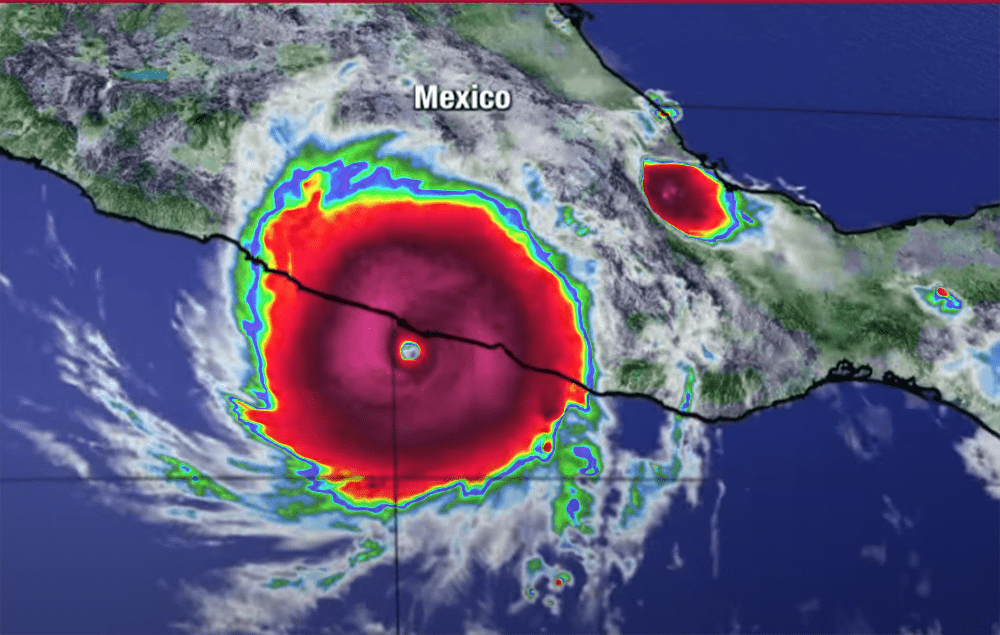Hurricane Otis Rapidly Intensifies, Strikes Mexican Coast, and Climate Change Implications

In a shocking turn of events, Hurricane Otis transformed from a tropical storm to a Category 5 hurricane in just a single day, catching forecasters off-guard. The powerful storm made landfall on Mexico's southern Pacific coast, and its aftermath continues to raise questions about the influence of climate change on extreme weather events.
The swift intensification of Hurricane Otis is what meteorologists refer to as "rapid intensification." It occurs when a storm's wind speed increases by at least 35 miles per hour within a 24-hour period. In Otis's case, its winds intensified by a staggering 110 miles per hour within 24 hours, an occurrence deemed "explosive intensification" by the National Hurricane Center.
This extraordinary event has left scientists bewildered, and it will be closely studied in the coming days to understand why it occurred and why forecast models failed to predict it. One factor contributing to rapid intensification is climate change, which has raised global ocean temperatures to record highs. Warmer ocean water provides the energy that fuels hurricanes, and as a result, they can strengthen rapidly when passing over these warm waters. A recent study on Atlantic hurricanes found that they are now twice as likely to experience rapid intensification compared to a few decades ago.
The impacts of climate change on hurricanes go beyond rapid intensification. While climate change doesn't necessarily lead to more hurricanes, it does make them more destructive when they occur. Warmer air holds more moisture, leading to increased rainfall and flooding during storms. Additionally, rising sea levels caused by climate change exacerbate storm surges, making coastal areas more vulnerable.
The United Nations recently released a climate report warning that the planet is approaching multiple "risk tipping points." These tipping points represent critical thresholds for various Earth systems, and the report underscores the urgency of addressing climate change. Some of the key findings in the report include:
-
Extreme Heat: Increasing occurrences of extreme heat events, like those seen in recent summers, could disrupt agriculture and harm human health.
-
Climate-Induced Migration: As regions become uninhabitable due to extreme weather, climate migration could lead to conflicts and humanitarian crises.
-
Species Extinction: Rapid environmental changes could lead to mass extinctions of plant and animal species.
-
Groundwater Depletion: Excessive groundwater usage could further deplete essential water resources.
Efforts to combat these climate-related challenges revolve around transitioning away from fossil fuels and adopting renewable energy sources. The tools for addressing climate change exist, but the speed at which this transition occurs is crucial. Delaying or slowing the transition increases the risk of passing critical tipping points that could result in irreversible damage to our planet.
While the challenges are substantial, understanding and acting on the science of climate change provides hope that we can mitigate its impacts and work towards a more sustainable future.
11 Month Ago
Robbers Loot Jewelry Shop in Mahottari; Traders Sh..
11 Month Ago
Trump and Putin to Discuss Ukraine on Tuesday
YOU MAY ALSO LIKE THIS
Top Free AI Websites in 2025 and Their Key Features
Artificial Intelligence continues to revolutionize how we work, create, and communicate, and 2025 offers an impressive array of fr..
3 Month Ago
2025 Global Entertainment Industry Sees Rising Streaming Subscriptions..
The global entertainment industry in 2025 continues to evolve rapidly with streaming platforms leading the way in reaching new aud..
3 Month Ago
Global Carbon Emissions Hit Record High in 2025 Despite Climate Effort..
In 2025, global carbon dioxide emissions from fossil fuels reached a record high, increasing by 1.1% compared to the previous year..
3 Month Ago

_1763308546.png)
 (1)_1763140461.png)
_1763140142.png)

